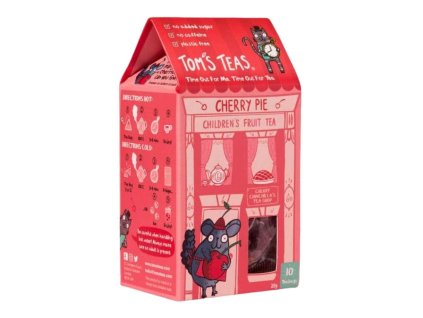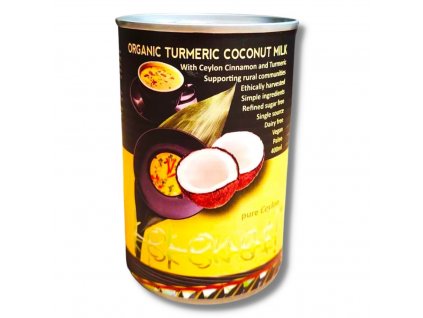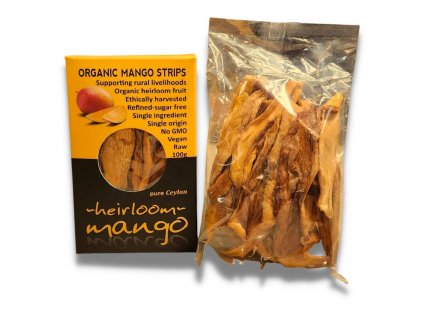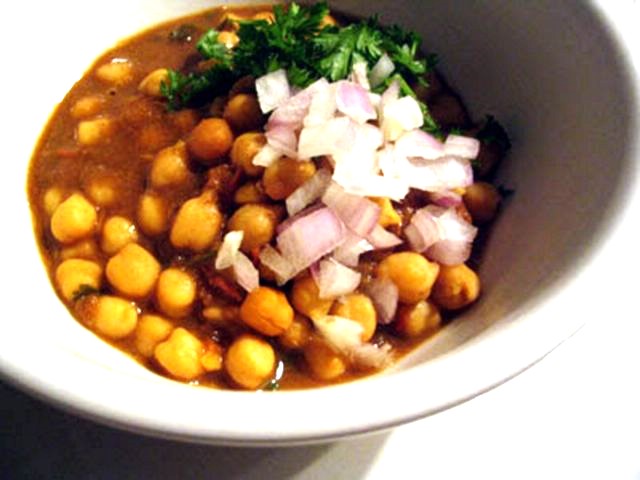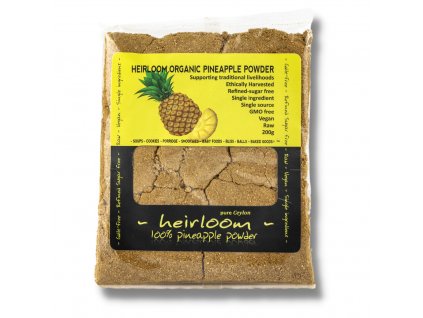Raw Ceylon dried mango - powder na překyselený žaludek, lepší trávení a pohyblivost střev - 400 g

Unikátní produkty
Dovážíme originální zahraniční výrobky, které lokální trh postrádá

Balíme rychle a ekologicky
Odesíláme do 24-48 hodin, vše v recyklovaných materiálech

Záruka kvality
Značky vybíráme srdcem a řídíme se heslem – raději méně, ale kvalitně

Doprava zdarma
Utraťte min. 4000 Kč a neplaťte poštovné do Balíkovny
Related products
Product detailed description
Dried powder of heirloom mango variety from Ceylon Kokonati is rich in fiber, vitamin A and C, and is naturally gluten-free. It is made from only one high-quality ingredient - dried and powdered mango. It has a great, slightly sweet taste and aroma of fresh mango.
In India, dried mangoes are widely used to reduce an over-acidic stomach, improve digestion and bowel motility - mangoes contain phenols and their compounds are powerful antioxidants. In India, mango powder is used for three problems that most pregnant women suffer from - indigestion, acidity and constipation.
Usage:
- Mango flour has multifunctional use for the preparation of sweet and savoury dishes.
- You can use it for cooking, baking, but also in a raw kitchen.
- For example, add a spoonful to your favourite smoothie to increase its nutritional value.
- Or substitute it for some of the traditional flour when making muffins, pancakes, waffles, cakes, cookies or bread.
- You can use it to thicken sauces, various dips, dressings, curry sauces or to create sweet fillings for baked goods.
- In Indian cuisine it is widely used to flavour curries, chutneys, soups and marinades.
- Dried mango is also used to enhance fish and chicken dishes.
- Dried mango has tenderizing properties, similar to lime and lemon juice.
Raw nutritious snack - quick and easy
- Mix in a blender with chopped nuts, dried fruit and seeds and you have a great sweet keto and raw snack bar.
- Or you can mix with desiccated coconut, nuts, seeds, a little salt and spices to make salty balls.
- Stir in plant or regular milk, add granola and you have a nutritious breakfast.
- You can also use it in secondary fermentation to make homemade kombucha, which adds both sweetness and a subtle mango flavour.
It is naturally gluten-free, raw, vegan, suitable for keto diet. It contains no sweeteners, preservatives, added sugar or other unnecessary fillers.
What is a heirloom variety?
A so-called heirloom variety (whether of plants, seeds, fruits or vegetables) is an open-pollinated variety that was commonly cultivated in earlier times in human history, but is not used in modern large-scale agriculture because of the cartel-like behavior of a large corporation like Monsanto, which is behind the destruction of ancient seeds and the food chain in general across the planet.
See the document below. And here is a link to the website of a Canadian university, The University of British Columbia, which explains briefly what it is. If you do not speak English, use the online translator: deepl.com
We have translated this paragraph from the English Wikipedia:
Before the industrialisation of agriculture, a much wider variety of plant foods were grown for human consumption, mainly because farmers and gardeners saved seeds and cuttings for future planting. From the 16th century to the early 20th century, the diversity was enormous. The old nursery catalogues were full of plums, peaches, pears and apples of many varieties and the seed catalogues offered legions of vegetable varieties. These catalogues were used to sell and trade valuable and carefully selected seeds along with useful advice on growing.
Since the Second World War, agriculture in the industrialised world has consisted mainly of food crops grown on large monoculture plots. Only a few varieties of each type of crop are grown to achieve the greatest consistency. These varieties are often selected for their productivity and their ability to ripen at the same time and withstand mechanical harvesting and transport across borders, as well as their resistance to drought, frost or pesticides. This form of agriculture has led to a 75% decline in the genetic diversity of crops.
Although heirloom or heirloom cultivation has retained its place in local communities, it has seen a resurgence in recent years in response to the trend towards industrial agriculture. In the southern hemisphere, heirloom plants are still widely cultivated, for example in home gardens in South and Southeast Asia. Before the Second World War, most of the products grown in the United States were heirloom varieties, but this was abandoned with the arrival of Monsanto.
Other sources of articles:
The practice of Monsanto and BASF of Germany in pushing dicamba (a weed killer) on American farmers
The Guardian:Revealed: Monsanto predicted cropping system will damage US farms
In the 21st century, many communities around the world are working to preserve historic varieties so that a wide range of fruits, vegetables, herbs and flowers are once again available to growers by restoring old orchards, sourcing historic fruit varieties, engaging in seed swaps and encouraging community participation.
Recipe for chickpeas with mango powder
- Preparation: 10 minutes
- Cooking time: 30 minutes
- For 6 servings.
Ingredients
- 2 cans of chickpeas, drained of juice
- 2 tablespoons ghee or butter/oil mixture
- 1 teaspoon cumin
- 2 teaspoons ground cardamom
- 1 whole cinnamon broken in half
- 1 teaspoon ground cumin
- 2 tablespoons mango powder
- 1 tablespoon ground coriander
- 1/2 teaspoon pepper
- 1/2 teaspoon turmeric
- 2 medium ripe tomatoes, finely chopped
- larger handful of chopped fresh parsley or coriander
- 1 1/2 teaspoons sea salt or to taste
- 1 small finely chopped red onion or shallot
Procedure
- Rinse the chickpeas. Keep 1 cup of liquid and set aside.
- Heat the ghee or butter and oil over a medium flame.
- When hot, add the cumin, cinnamon stick and stir for 1 minute.
- Now add the rest of the ground spices, mix and add the tomatoes.
- Cook uncovered, stirring frequently, for 5 to 10 minutes or until tomatoes are reduced.
- Now add the chickpeas, liquid and half of the chopped parsley or coriander.
- Cover the pot and cook, stirring occasionally, for 20 minutes or until the sauce thickens.
- Remove from the heat and season with salt.
- Serve hot, garnished with the remaining parsley or coriander and chopped red onion or shallot.

Ceylon Kokonati uses only single origin, ethically harvested non GMO ingredients for their products. Their products are vegan, gluten-free, suitable for keto, paleo and raw diets. They do not contain any refined white sugar.
By buying them, you support traditional livelihoods and reduce your carbon footprint - because the products are produced and packaged right at the harvest site. Ceylon Kokonati strives for 100% zero waste production.
This product is internationally accredited by Control Union, certified organic (EU and USDA NOP), ISO and/or HACCP certified.
Ceylon Kokonati manufactures its products in a family-run sweatshop, pays fair prices to its suppliers and manufacturers, and incorporates generations of knowledge into its production processes. It uses only the highest quality ingredients. So you can be sure that you are getting premium quality at a premium price. By buying flour, you support the traditional livelihoods of villagers in the dry areas of Sri Lanka. This allows the villagers to benefit from their years of knowledge and expertise.
The sale of these products plays a vital role in employment and economic support for the village community. Ceylon Kokonati provides the children of its employees with school books and stationery for the entire school year.
Read more on this topic
What to take with you on a hike?
Additional parameters
| Category: | Flour |
|---|---|
| Size: | 200 g, 400 g |
| Specs: | Vegan, Low carb, Biohacking, No added sugar, Supplement, Dried superfood |
| Vhodné pro: | Keto-Paleo-GMO Free-Vegan-Bezlepková dieta-Low Carb-Sugar Free |
| Výrobce: | Ceylon Kokonati |
| Země původu: | Srí Lanka |
| Proč koupit: | Jediná ingredience, balena u zdroje, nikdy žádné příměsi, single-origin, GMO-free a vegan. |
Be the first who will post an article to this item!
Be the first who will post an article to this item!
Značka Ceilon Kokonati vznikla v roce 2013. V jejím sortimentu můžete najít řadu vysoce kvalitních a cenově dostupných produktů z kokosových ořechů, koření a tropického ovoce, vyráběných udržitelným způsobem.
Název značky odkazuje na zemi, kterou její zakladatelé považují za svůj domov Cejlon na Srí Lance, kde se také kokosy pro výrobu této kokosové řady produktů pěstují i zpracovávají. Cejlon, britská korunní kolonie v letech 1815-1948, je nyní známý jako Srí Lanka, ale zakladatelé značky mu raději říkají Cejlon, protože to rozhodně zní exotičtěji a "čistý Cejlon" je značka sama o sobě, připomínající svěží jedinečnou esenci čistého cejlonského čaje. “Kokonati” je zase maorský výraz pro kokos, takže naprosto nejvhodnější název značky těch nejkokosovatějších dobrot vůbec.
Značku Ceilon Kokonati vede manželský pár. Ženskou zakladatelskou polovičkou je paní Bûmika, což v sanskrtu znamená Paní Země. Její pradědeček byl jedním z průkopníků lisování kokosového oleje na Cejlonu, takže je již čtvrtou generací lisovače kokosového oleje. Mužská zakladatelská polovička, pan Mosqi, je zase původně pěstitelem čistého cejlonského čaje.
Ceilon Kokonati je stoprocentně vlastněna a provozována na Novém Zélandu. Sypké produkty od Kokonati používá několik etických značek, které vyrábějí čisté, ekologické potraviny a kosmetické výrobky. Prodejem výrobků Kokonati jsou podporovány venkovské komunity a tradiční způsoby obživy. Všechny jejich výrobky jsou eticky sklízeny a při jejich výrobě nevzniká téměř žádný odpad. Každá část kokosového ořechu je využita při výrobě jiného produktu. Výrobky Kokonati jsou jednosložkové, balené přímo u zdroje, nikdy nemíchané, jednodruhové, bez GMO a veganské.
Díky nadšení pro ekologické, regenerativní zemědělství, udržitelnost a kolektivní partnerství pocházejí výrobky Kokonati pouze z drobných farem a mlýnů ve venkovských vesnicích na Srí Lance. Každý výrobek Kokonati se vyrábí ve specializovaném mlýně, který produkuje pouze daný typ výrobku. Kvalita je tedy nejlepší, jaká může být, a každý krok výroby je podpořen zkušenostmi a znalostmi mnoha generací. Cejlon je požehnán množstvím zdravého, exotického ovoce, ořechů, bylin a koření.
Ceilon Kokonati se řídí zásadami vyváženého života - žij a nech žít.
Snaží se o to, aby vše zůstalo v ještě lepším stavu, než když to našli…


